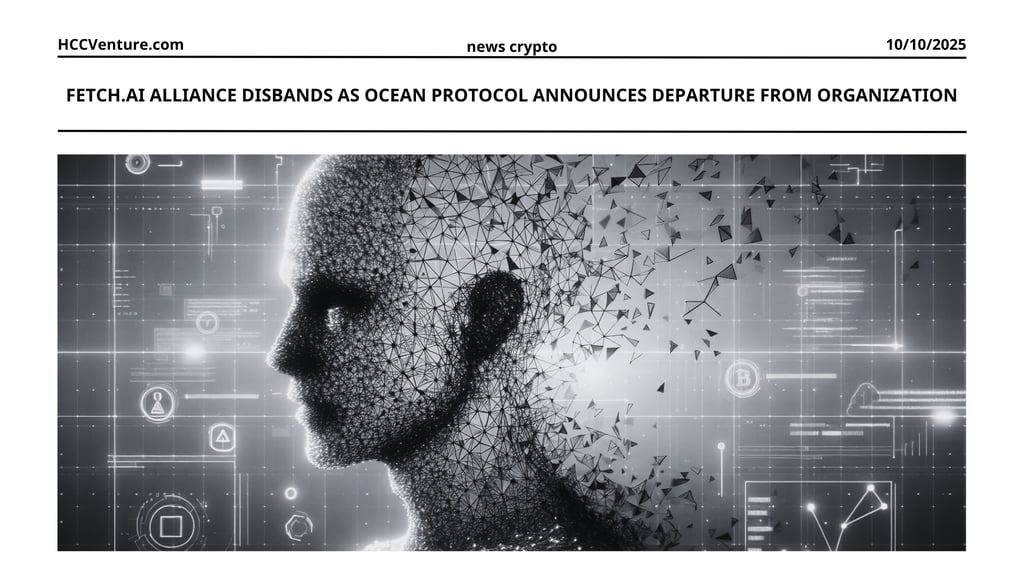Fetch.AI Alliance Disbands as Ocean Protocol Announces Its Departure
Announced in Singapore, the exit ends an 18-month merger process with Fetch.ai and SingularityNET, citing irreconcilable visions over funding and governance.
10/10/20252 min read


Ocean Protocol leaves the organization
Ocean Protocol, a leading Web3 data infrastructure project, has officially withdrawn from the Artificial Super Intelligence (ASI) Alliance — a collaboration originally designed to unite Fetch.ai , SingularityNET, and Ocean Protocol into a unified decentralized AI ecosystem.
The decision marks a significant strategic shift, as Ocean seeks to restore independence, reassert control of its product roadmap, and pursue new exchange listings for its native token OCEAN in the coming months.
The ASI Alliance, launched in early 2024, aims to create a unified AI token ecosystem that combines data (Ocean), agents ( Fetch.ai ), and intelligence infrastructure (SingularityNET) under a common framework. The plan is to integrate three tokens — OCEAN, FET, and AGIX — into a unified ASI token, boosting liquidity and interoperability in the ecosystem.
However, despite its ambitious vision, the alliance has faced technical, governance, and community integration challenges, particularly in unifying the very different missions of its members:
Ocean focuses on data encryption and privacy-protecting data sharing.
Fetch.ai focuses on automated AI agents and automation frameworks.
SingularityNET pursues multi-purpose decentralized AI markets.
Ocean's withdrawal signals a return to its original Web3 data economy mission, with the project reasserting its independence from multi-protocol governance and token mergers.
From fever to crack
The ASI Alliance merged Ocean Protocol (OCEAN), Fetch.ai (FET), and SingularityNET (AGIX) into a $7.5 billion behemoth, giving birth to the ASI token as a unified governance and utility layer for decentralized AI. The idea? Counter the centralization of OpenAI with open-source actors, data marketplaces, and shared computation—peaking at $15 billion in FDV amid the AI craze.
The token swaps locked 50% of OCEAN’s supply into ASI, stifling liquidity and alienating holders as FET’s dominance (70% of the post-merger capitalization) overshadowed Ocean’s niche. By mid-2025, TVL stagnated at $500 million amid a governance stalemate—Ocean’s data focus clashed with Fetch.ai ’s agent swarm ambitions . As one analyst joked, “Mergers amplify alpha until egos collide.” This retreat, while abrupt, fits with a larger shift in the AI crypto space: SingularityNET’s internal reorganization and FET’s 40% year-over-year decline signaled alliance fatigue.
Evaluation and Conclusion
Ocean Protocol's departure from the ASI Alliance represents a strategic reset — a reassertion of sovereignty over the mission of building a Web3 data economy where data becomes a liquid, tradable asset.
This decision could strengthen Ocean's long-term position by clarifying its identity and removing confusion caused by overlapping alliances.
If the project succeeds in relisting on exchanges and re-engaging with institutional partners, Ocean could re-emerge as a key independent force in the field of decentralized data integration and AI — operating alongside but distinct from the broader ASI ecosystem.
In a market where the boundaries between AI and blockchain are rapidly converging, Ocean’s new independence may not be a retreat — but a strategic adjustment toward focused innovation and clarity in governance.
Disclaimer: The information presented in this article is the author's personal opinion in the cryptocurrency field. It is not intended to be financial or investment advice. Any investment decision should be based on careful consideration of your personal portfolio and risk tolerance. The views expressed in this article do not represent the official position of the platform. We recommend that readers conduct their own research and consult with a professional before making any investment decisions.
Explore HCCVenture group
HCCVenture © 2023. All rights reserved.

Connect with us
Popular content
Contact to us
E-mail : sp_contact@hccventure.com
Register : https://linktr.ee/holdcoincventure
Disclaimer: The information on this website is for informational purposes only and should not be considered investment advice. We are not responsible for any risks or losses arising from investment decisions based on the content here.


TERMS AND CONDITIONS • CUSTOMER PROTECTION POLICY
ANALYTICAL AND NEWS CONTENT IS COMPILED AND PROVIDED BY EXPERTS IN THE FIELD OF DIGITAL FINANCE AND BLOCKCHAIN BELONGING TO HCCVENTURE ORGANIZATION, INCLUDING OWNERSHIP OF THE CONTENT.
RESPONSIBLE FOR MANAGING ALL CONTENT AND ANALYSIS: HCCVENTURE FOUNDER - TRUONG MINH HUY
Read warnings about scams and phishing emails — REPORT A PROBLEM WITH OUR SITE.
